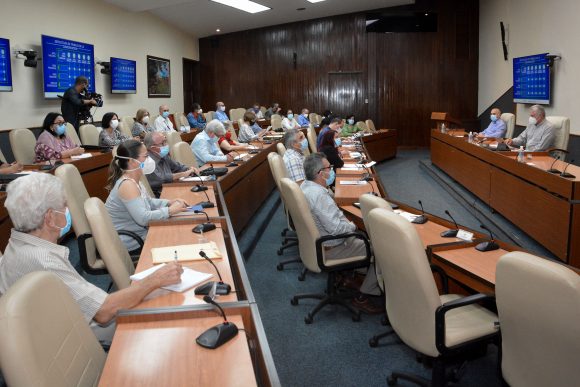
HAVANA, Cuba, Feb 17 (ACN) The days ahead do not seem favorable for the prevention and control of COVID-19. At least that is what short-term forecasts predict. Confirmed cases will increase; recovered patients will also increase, but on a smaller scale than the number of new patients.
These are the forecasts. The mathematical models are fairly accurate. However, trends can be broken -they have to be broken-, and this is said -words more, words less- by the same mathematician who coordinates the construction and running of the models, Dr. Raúl Guinovart Díaz, MD. Raúl Guinovart Díaz, dean of the Faculty of Mathematics and Computer Science at the University of Havana.
When the human being is the main variable in the equations, anything happens. But if you want, it can be for the better. The trend is reversible with all the measures that are being taken, and their strict compliance, Guinovart said.
We have to stop the interaction between healthy and infected people; we have to do everything that is established in the Cuban protocols for the prevention and control of the epidemic caused by the new coronavirus, he said.
At this week's meeting of the President of the Republic, Miguel Díaz-Canel Bermúdez, with scientists and experts involved in science and technological innovation activities in the fight against the new coronavirus, the updating of forecasting models was discussed as usual, among other issues.
PhD Beatriz Marcheco Terruel, director of the National Center of Medical Genetics, presented the update of the study Genetic risk factors associated to the clinical severity of COVID-19 in Cuban patients, a valuable analysis that received maximum attention and praise from the participants.
The scientific evaluation included a study of COVID-19 convalescents in Havana; another on the characteristics of the disease in the pediatric population, and a third on the prenatal follow-up of pregnant women with COVID-19 and evaluation of newborns. Immunogenetic risk factors in older adults; risk factors associated with severity and/or mortality and the response of antibodies against SARS-CoV-2 in convalescents were also studied, among other topics.
Marcheco Terruel informed that the particular study of Havana suggests that the level of population aging in the municipalities of the northern region increases the frequency of older adults with severe forms, which should be considered as part of the prevention strategies and organizational strategies to face the epidemic.
She pointed out that the alterations in the hematological parameters observed two to three months after having suffered from the disease indicate the need for a prolonged follow-up of patients with severe forms.
In addition, the persistence of symptoms during convalescence was independent of disease severity, which requires careful clinical evaluation for each convalescent in the primary care setting.
A second conclusion of the study states "that children under 18 years of age are silent disseminators of the disease, presenting more frequently with asymptomatic forms. Almost half of the children who were infected do not have antibodies to SARS-CoV-2, which poses a potential risk of reinfection", so "it is recommended that this fact be considered in the design of prevention strategies, including prophylactic vaccination".
Sidebar

 Agencia Cubana de Noticias
Líder en información nacional
Agencia Cubana de Noticias
Líder en información nacional








Nos reservamos el derecho de no publicar los comentario que incumplan con las normas de este sitio